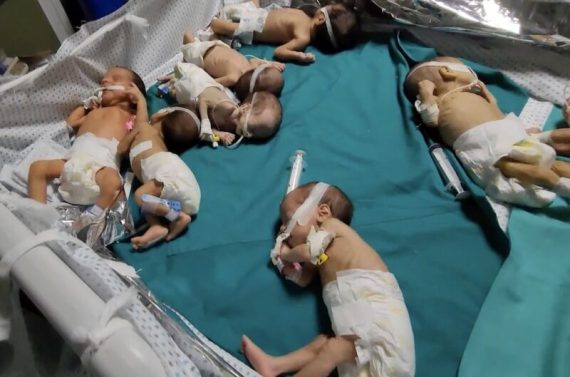I
n a distressing report released by Save the Children on November 14, nearly 15,000 babies are anticipated to be born into a rapidly deteriorating situation in Gaza by the end of 2023.
The ongoing conflict has severely disrupted access to essential services, with the organization highlighting the acute risk these newborns and their mothers face amid escalating violence and shortages of medical supplies, clean water, and food.
The humanitarian crisis in the besieged Palestinian enclave is intensifying as medical facilities are overwhelmed with the influx of casualties and the impending wave of births. According to recent UN data cited in the report, approximately 180 women give birth daily in Gaza, with a significant number experiencing pregnancy or birth-related complications.
The besiegement and recent attacks have put an unprecedented strain on the healthcare system, with 22 of Gaza’s 36 hospitals now classified as “non-functional” by the World Health Organization (WHO).
Dire conditions for mothers and infants
The conditions described by Maha, a Save the Children staff member in Gaza, paint a bleak picture of the reality in hospitals. “Pregnant women in the hallways screaming in pain, unidentified newborn babies in incubators with no living family members,” she recounted.
The absence of fuel has halted the operation of life-saving equipment, leading to a situation where, as Jason Lee, Save the Children’s country director in Palestine, put it, “Babies are being born into a nightmare.”
The conflict’s toll on the population is staggering, with Palestinian authorities reporting at least 11,320 killed, including nearly 7,800 women and children, and over 29,200 others injured. The Israeli military has conducted air and ground operations in response to actions by Hamas, leading to extensive damage to buildings, including hospitals, mosques, and churches. The Israeli death toll stands at 1,200, based on official figures.
Calls for ceasefire and international support
Humanitarian organizations are urgently calling for a ceasefire and for fuel to be allowed into Gaza to run hospital generators. “We need a ceasefire. We need it now,” Lee emphasized, reflecting the desperate cries for peace and assistance.
The international community faces a critical challenge in addressing the immediate needs of the people in Gaza and finding a sustainable resolution to the conflict. The situation underscores the broader implications of geopolitical strife on the most vulnerable, particularly pregnant women and children, who are caught in the crossfire of larger power struggles.
As Gaza’s medical infrastructure teeters on the brink of collapse, Save the Children and other NGOs are appealing for international humanitarian aid and the protection of civilians. The provision of basic necessities and medical supplies is paramount to prevent further loss of life and to give the thousands of babies about to be born a chance at survival.
The situation in Gaza remains tense, with global observers closely monitoring the unfolding humanitarian crisis and the international community’s response to the urgent calls for support and a move towards peace.
Sources: Anadolu Agency and TRT World
Recommended





